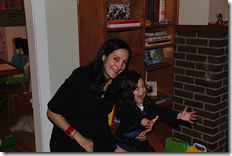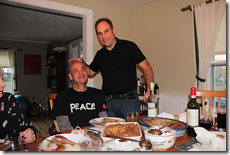Matthew Dicks's Blog, page 570
December 10, 2011
In need of an alibi?
I can't help but be impressed by this service, as distasteful as it may be.
The Alibi Network is a service that assists clients in falsifying segments of their lives in order to facilitate dishonest and disreputable behavior.
Based upon the website, it would appear that the bulk of their work is done with married men and women who are attempting to conceal an affair, but they also seem to be rather effective at assisting clients in avoiding work commitments, enhancing their image through the falsification of work history, making discreet purchases on the client's behalf, and providing the documentation needed to avoid embarrassing mistakes.
It's not the most noble way to make a living, but it's creative, clever and not illegal.
The website is poorly designed and looks like something from the 1998 version of the Internet, and their slogan (Empowering Real People in the Real World) seems incongruous to the service they offer, but the company has been featured by several mass media outlets and appears fairly reputable.
The website lists 15 specific services, of which I found these 7 especially intriguing:
Need to Hide a Discreet Affair?
Married and looking? We invent, create and provide customized alibis and excuses for attached adults involved in discreet relationships or encounters.
Virtual Hotel Service
Toll free or local virtual hotel number answered by a virtual front desk clerk 24 hours a day. The operator will greet a caller with the appropriate hotel greeting message and will handle the call according to the instructions.
Rescue Call Services
The discreet phone call from us to communicate any information you desire or to help you escape any situations such as dull meetings, bad dates or other unnecessary commitments that need to be cut short or cancelled.
Virtual Doctor's Office / Doctor Excuses Notes
Looking for a doctors excuse note to get away? Supported by the local virtual doctor's office phone number anywhere in the world? Your doctors excuses notes are only a click away.
Virtual Seminar/Training:
We offer a solid and a carefully constructed 2 to 5 days alibi and excuse package for our clients who are comfortable with the idea of going to a training/seminar and need an excuse to get out of town for a discreet affair.
Virtual Employment
Are you embarrassed to be unemployed? Do you have a critical life situation that requires you to have a job? Would you like to create an impression that you have your dream job? With your own virtual office, executive assistant and business cards?
Fake Novelties
Are you embarrassed to admit you missed the show? We provide fake tickets for past events, fake receipts, fake confirmations and many other novelty items for pranks and practical jokes.
December 9, 2011
I finally found something I want for Christmas.
Satan at Christmas time
We have two sets of Christmas stocking hangers in our home.
One set features words like Joy, Peace and Noel. They sit atop the mantle with small hooks dangling just below the mantle from which stockings can be hung.
They are quite beautiful.
The second set consists of five letters that spell the word Santa. Each letter also has a hook from which stockings can be hung.
They are also lovely.
Both sets are cast in a luminescent metallic sheen that captures and reflects the colored light from the Christmas tree beautifully.
Since we typically hang stockings for the three human beings and the two pets in our home, the Santa stocking hangers have been the hanger of choice for the past few years.
Five hangers for five stockings.
This year my wife chose the alternate set of hangers, doubling up stockings on a single hanger rather than using the set with a hanger for each stocking.
I was disappointed. I much prefer the Santa hangers.
Not for their beauty or utility, mind you, but because when my wife isn't looking, I like to rearrange the letters on the mantle so that they spell Satan instead.
Sometimes days went by before she noticed the switcheroo.
And perhaps this is why we are using the alternate set this year…
Young, thin and preferably blond
As a Patriots season ticket holder, I attend almost every home game, so I have become quite familiar with the way in which the game is produced inside Gillette Stadium. The selection of music, the firing of muskets, the introduction of players, the pregame entertainment, etc.
It's all very scripted and very predictable.
Throughout the game, during timeouts and other stoppages in play, the enormous television screens at either end of the field often feature images of fans in the stands.
If you've ever been to a live sporting event, you've probably seen it before.
The camera alights upon a group of four young men. They realize that they are onscreen. It is clear that they are all slightly drunk. They all wave in the wrong direction.
The camera alights upon an enormous man whose beard makes him look as if he could've played for Led Zeppelin. He grins and offers the camera a lazy thumbs-up.
The camera alights upon a small boy in a Tom Brady jersey eating a hotdog. He sees himself onscreen and begins jumping up and down, causing me to worry that a hunk of hotdog is about to become lodged in this throat.
These are typical images captured by the Gillette Stadium "Fan Cam" each week.
At last Sunday's Patriots game, the camera operators returned several times to an attractive young blond wearing tight jeans and a shirt that exposed her midriff when he arms were in the air. Each time the camera alighted on her, she was already dancing, smiling and otherwise bouncing about.
She was the only person who appeared on the screen more than once that day, and she may be the only person to appear more than once on the screen in my three years of season ticket ownership.
I'm not dumb. I know why this young woman was featured so often onscreen. She was beautiful, enthusiastic, and dressed in considerably less clothing than most fans. And at more than half of the fans in the stadium are male.
But it left me wondering how this made the female fans feel.
For a man to be chosen to appear onscreen, he can weigh 300 pounds and have a beard that reaches down to his waist.
He can be wearing a saucepan on his head and a clown nose.
He can be covered in silver and blue makeup from head to toe.
A man's size, weight, age, facial hair or style of dress seems to have no bearing on determining if he will be featured on the big screen.
But the women who appear on the screen tend to be young, thin and beautiful.
How does this make the rest of the women in the stadium feel?
I'd like to think that I can imagine how this must make the rest of the women in the stadium feel, but the only thing I know about women with any degree of certainty is that I should never pretend to understand women with any degree of certainty.
But as the father of a little girl, it does not make me happy.
I'm not exactly sure why, but it does.
December 7, 2011
Buffering, procrastination and taunts from the mouth of a babe
While putting my two year old daughter to bed tonight, she said the following things:
1. Peep is buffering, Daddy.
She was watching Peep and the Big Wide World on her iPhone while I was brushing her teeth, combing her hair and sliding on her pajamas.
Yes, she was correct. The video was buffering.
2. I don't want you to turn the page. Then I'll have to go to bed! Read it again!
We were reading CORDOROY and had arrived at the penultimate page. As I went to turn it, she grabbed my hand and stopped me. She knew that once we finished reading the book, she would need to go to bed.
Procrastination at its best.
3. Daddy, I want to taste the sky. Can you taste it with me?
She continues to taunt me in terms of my inability to reach the stratosphere.
My approach to the book tour: Part 2
Yesterday I described the format of my typical book talk.
Today I offer a few suggestions on how to guarantee success at a book talk.
1. One of the criticisms of my book talk format is that not everyone has a plethora of stories to tell about their books, and in these cases, reading from the text is required in order to fill the time.
I do not believe this to be the case.
Even if it were true, however, I don't think that filling the time by reading large portions of your book is ever a good idea.
But still, I believe that everyone has a story to tell.
While I have admittedly led a less-than-conventional life, I believe that everyone has stories waiting to be told. When I prepare to compete in a Moth storytelling competition (as I am doing now), the first thing I do is ask my ten closest friends for stories that might fit the assigned topic, because I am constantly forgetting many of my story-worthy moments and discarding others as not interesting enough.
Do the same. Ask your friends and family what stories might be appropriate for your book talk, and remember that the connection between the story and the book does not have to be very strong.
If it's a highly entertaining story, there connection between it and the book can almost be indiscernible.
Also remember that people love to read and listen to stories about work. Pulling back the curtain on your experience in the publishing world is often fertile grounds for storytelling.
2. When you're finished with a book talk, write down all the questions that the audience asked you, or better yet, have a friend attend your talk and do this for you. Questions from the audience often serve as excellent prompts for future stories, and they can often guide you in terms of what your future audiences will want to hear.
One of the questions I get quite often asks how and when I decided to become a writer. The answer to this question is actually an interesting and amusing story from my days in high school, but I would have never thought to include this story in any of my talks had I not been asked the question so often. When you find a story that audiences seem to appreciate, don't wait for someone to ask you the right question in order to tell it. Find a way to include it in every talk.
3. Do not read from notes. You should always speak extemporaneously. As unfair as it may be, audiences expect authors to be effective, engaging public speakers, even though we spend much of our time alone and in our heads. Reading word-for-word from a script (which I have seen done twice) will only cause the audience to question your abilities as a storyteller. More importantly, watching someone read from a script is never entertaining. Better to stumble a few times and speak from the heart than to simply read from a set of notecards.
4. Don't be afraid to form a partnership with another author. There is nothing wrong with sharing the stage. Not only does this double your prospective audience and introduce you to a new set of readers, but it can also be very helpful to a less experienced, less effective public speaker.
I have partnered with a very successful author in the past who is an excellent writer but a less effective public speaker. While she has many interesting stories to tell, she is often unable to weave these stories seamlessly into her talk. She becomes nervous onstage and requires a moment or two to formulate her thoughts before she is able to answer questions from the audience. When we work together, I serve as a moderator of sorts, sharing my own stories but also providing openings that allow her to tell her stories as well. I answer questions from the audience first in order to provide her the time she needs to think, and I prompt her with questions of my own that I know will engender interesting and amusing responses from her. The format works quite well, and together, we are able to draw a fairly large number of people to our events, making our talks enormously successful.
5. A partnership between a traditionally published author and an indie author or even a self-published author can also be highly beneficial to both parties. Indie and self-published authors often have a difficult time arranging appearances in bookstores and libraries, but if they are partnered with a more traditionally published author, bookstores and libraries can often be convinced to sponsor a joint event. In return for helping these authors gain access to these venues, traditionally published authors will often find themselves with considerably larger audiences than what they are normally accustomed to. Indie and self-published authors are people who have to aggressively sell themselves and will often pound the pavement incessantly in order to ensure that there is a decent-sized audience at an event. A traditionally published author can take advantage of this entrepreneurial spirit by helping the indie author gain access to a venue and thus ensuring a very successful event for both parties.
6. The day before an appearance, I often ask my Twitter and Facebook followers if there are any questions that they would like answered at my event, even if they will not be in attendance. I write these questions on notecards and will use them to initiate the question-and-answer session if needed. Having them in my pocket means that I am guaranteed to have 3-5 questions that I can use is my audience is less than forthcoming in terms of questions, and because I was able to choose them, they are questions that I know will provide me with interesting stories to tell.
7. Be the last to leave person to leave your event. Close up shop with the bookseller or librarian if possible. The extra twenty or thirty minutes that you spend at the end of the night will mean a great deal to the stragglers who have hung around hoping for just a few more minutes with an author they admire. Above all else, never appear to be in a rush to leave. No author, regardless of his or her success, is so important as to run out the door immediately following the talk.
8. There is always one crazy person at every book talk (or at least this seems to be the case). These are people who will attempt to monopolize your time, thrust half-written manuscripts into your hand and tell you stories about the conspiracy behind their failure to publish. When you encounter these people, I try to be as direct and polite as possible. With luck, your host will help redirect this person away from you.
9. It's always better to be self-deprecating than self-aggrandizing. Save all your success stories for your parents and grandparents. Book talks are the time to roll out the most embarrassing and humiliating moments of your life. Nothing helps an author connect to an audience better than a reminder that he or she can be just as stupid at times as everyone else.
Thoughts on these suggestions?
Suggestions that you'd like to add?
Have you attended any of my previous book talks and have anything additional that you'd like to add about my performance?
We're all ears.
Our little Nutcracker ballerina
My wife sent me this video to me while I was at the Patriots game on Sunday.
It's adorable, but I spent half the day trying to figure out how the hell my daughter was able to identify the music from The Nutcracker.
Turns out my wife has been playing it for her for a while.
I was concerned that it was Teddy again.

December 6, 2011
My approach to the book tour
The Wall Street Journal's Joanne Kaufman wrote a piece on the way in which bookstores are beginning to rethink the traditional book tour that got a lot of attention in the publishing community.
I have always followed a slightly non-traditional approach to my author appearances, similar to the rethinking that Kaufman describes, and I believe that it has served me well.
Before I began my first book tour, I attended the reading of a bestselling author. The appearance lasted a little more than an hour, and nearly the entire time was consumed with the author reading from the new book.
I literally watched audience members, mostly men, nod off in the process.
A friend had accompanied me to the event, and he leaned over as the author droned on and asked, "Is this what you're going to have to do?"
I vowed to avoid reading from my books whenever possible from that day on.
Since publishing SOMETHING MISSING in the summer of 2009, I have spoken about my books more than one hundred times at bookstores, libraries, colleges, literary festivals, weekend retreats and book clubs. While I occasionally read from my books, I only do so when an audience member or the person hosting the event insists.
When I read, I always make it exceedingly short.
For me, an author appearance is an opportunity to introduce myself, rather than my books, to an audience. While I hope to provide lots of background information about my books via storytelling and interest audience members enough to purchase a book, I know that there is more long-term value in making fans than in making immediate sales.
On more than one occasion, I have chosen to forgo speaking about my books entirely. Not one mention of title or plot or characters.
I've always felt that if an audience likes me and finds me interesting, they will read my books.
When I speak to an audience, my goal is to be a storyteller. I want to entertain. Make them laugh. Provide new and unusual insight. Make a connection.
I don't want audience members to walk away feeling like they just received the hard sell. I want them to feel like they know me better as a person, and with some luck, they want to know even more.
My appearances typically consist of three parts.
Part 1 is pure storytelling, and it fills more than half of the time that I am speaking. I gather as many amusing, unusual or interesting stories surrounding the book as possible and share them with the audience. These could be stories about the actual process of writing the book, personal stories that connect to characters and/or plot lines or stories from my life that provided inspiration for the book.
For my most recent book, UNEXPECTEDLY, MILO, this included stories about my fourth grade classmates, the day my daughter was born, a visit to Boca Raton, my wedding day, my grandfather and his experiences in World War II and more. Each story has a specific connection to the book (some stronger and more direct than others), but more importantly, each story illuminates an aspect of my life while making audience members laugh and think and connect.
Part 2 consists of a series of book recommendations. I bring a stack of books to every author appearance and share these recommendations with the audience, reading tiny snippets from the books whenever possible. I try to include a mix of genre and formats, and I also always try to have a story or anecdote to tell about each book that I am going to recommend. This serves three purposes.
It gives the audience a chance to get to know me as a reader.
It gives me a chance to promote the authors who I love.
Most important, it gives me another opportunity to tell stories about myself and the books that I adore.
Part 3 is a question and answer session, and I always begin this portion by encouraging the audience to ask anything that they would like. The stranger the question, the better. Sometimes I bring a prize for the audience member who asks the most unusual question of the evening, just to encourage more out-of-the-box thinking. I encourage people to try to stump me, embarrass me, shock me, or put me on the spot with their questions, because I know that this will often be entertaining to the rest of the audience.
The strangest question I ever received (and it was asked in all sincerity) was:
What role do your ex-girlfriends and former lovers play in your writing life?
While the real answer is none, I used the opportunity to weave in three amusing stories about ex-girlfriends, one which had the audience roaring with laughter.
Every opportunity to tell a story should be seized by the throat.
I have also learned that you cannot rely on audience questions for the bulk of your talk, because there are times when you simply will not be asked very many questions. If I was guaranteed an unending stream of questions, I would almost prefer to transform my whole talk a question-and-answer session, since this would probably result in the most dynamic and surprising of exchanges. But audiences are a fickle bunch. Some have questions but are too nervous to ask them in front of others. Others simply wish to be passive participants in the event. Sometimes people just can't think of anything to ask. And sometimes people want to go home because their favorite television show is coming on at 9:00.
I've had to stop answering questions after 45 minutes, and I've also received only one or two token questions from the event host.
Once I am done speaking, I remain behind to sign books, but I also invite audience members to ask me any additional questions that they did not want to ask publicly while I sign their book. This leads to quite a bit of discussion, and many times I end up leading a second question-and-answer session with the hardcore book lovers who have not already left.
This is oftentimes my favorite part of a book talk. These are the people I typically want to get to know best. These are the people who read fifty books a year and will go to work tomorrow talking about me and my stories.
These are the people who will become legitimate fans of my work.
Tomorrow I'll offer some tips that will help even the shiest and most inexperienced author deliver a winning book talk at his or her next event.
December 5, 2011
Cute Thanksgiving Day photos
This is pure, self-aggrandizing pride in the cuteness and joy of my little girl on Thanksgiving Day.
Forgive me.
A reminder that some of the best gifts come in cheap packages. And in some case,the best gifts are actually cheap packaging.
This insightful and amusing post on the five best gifts of all time (stick, box, string, cardboard tube, and dirt) reminds me of a poem that I wrote years ago that won a contest in the now-defunct magazine Beginnings.
It seems rather fitting during this holiday season while so many of us are also focusing on austerity.
_______________________________________
Save Your Money Next Time and Just Give Me the BoxThank you Mother,
for the red, aerodynamic toboggan
that I found under the Christmas tree this morning,
with its chiseled runners and
precision steering wires.
But Mother dearest,
in the future,
please know that I have found nothing more exhilarating
than a steep, muddy hill
and a sturdy refrigerator box.
-Matthew Dicks










